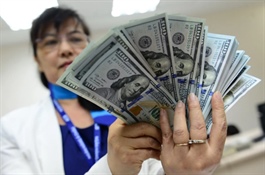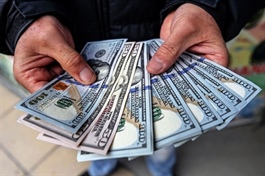Banking sector gets ball rolling on 2024 performance
Banking sector gets ball rolling on 2024 performance
Forecasts for Vietnam from financial institutions are optimistic for this year, primarily due to policies for reducing interest rates and bolstering digitalisation.

Phan Duc Tu, chairman of BIDV’s Management Board, reported that by the end of 2023, the bank had comprehensively fulfilled all targets set by the State Bank of Vietnam (SBV).
The total scale of assets reached over $95.35 billion. Credit outstanding reached $73.84 billion, growing by 16.6 per cent. Credit capital was concentrated in priority sectors and growth drivers in line with the government and the SBV directives.
BIDV, in particular, vigorously implemented the government and SBV directives in executing credit programmes, facilitating access to credit for enterprises and citizens, restructuring debts, initiating new loans, reducing, exempting interest rates, and fees.
“With all these measures, in 2023, BIDV reduced profits by nearly $248.94 million to support customers in overcoming difficulties, maintaining, recovering, and developing business operations,” Tu said.
At Agribank, Pham Duc An, chairman of the Council of Members, revealed that within their financial capability, Agribank had implemented an 8 per cent interest rate reduction for various customer segments, with the highest reduction rate being 4 per cent per annum.
Cumulatively, in 2023, the total interest amount Agribank supported for customers was approximately $204.6 million. Agribank deployed 13 preferential credit programmes worth $8.44 billion with lower interest rates by 2-3 per cent per annum compared to normal lending rates. Simultaneously, they implemented policies to restructure loan repayment periods while maintaining a specific group of loans for customers facing difficulties in cash flow repayment.
Disregarding the profit figures for 2023, Tran Minh Binh, chairman of VietinBank’s Management Board, revealed that the bank’s credit balance was propelled from the beginning of the year, consistently maintaining a higher level compared to the industry average. By the year-end, it reached 15.6 per cent, contributing an additional $8.44 billion to the economy.
“VietinBank effectively implemented government and SBV policies, such as interest rate support, with a debt balance of $506.3 million, marking the highest interest-supported debt among other credit institutions. Moreover, there was a strong focus on lending in priority sectors as per the government’s directions, accounting for about 40 per cent of the total debt portfolio,” Binh said.
Similar to VietinBank, Luu Trung Thai, chairman of MB’s Management Board, said its credit growth in 2023 reached 28.8 per cent, with debt for priority sectors making up 65 per cent.
MB adjusted interest rates seven times in 2023, with reductions ranging from 2-4 per cent to aid customers in accessing capital, contributing over $324.9 million to the state budget. Simultaneously, stringent credit quality control was maintained, with the lender’s bad debt ratio at approximately 1.44 per cent.
According to the investigation into the business trends of credit institutions and foreign bank branches in Vietnam conducted by the SBV, the business situation and pre-tax profit of the banking system in the fourth quarter of 2023 slightly improved compared to the previous quarter but fell significantly short of the expectations recorded in the earlier survey.
In an overall assessment of 2023, financial institutions concluded that the business performance fell short of expectations. Moreover, there was a notable downward adjustment in the expected growth rate of pre-tax profits compared to the previous forecast. Specifically, 78.6 per cent of these institutions foresaw a positive growth in pre-tax profits for 2023 compared to 2022, and 17.9 per cent of which predicted a decline, while 3.6 per cent estimated no change.
Ngo Dang Khoa, director of Foreign Exchange, Capital Markets, and Securities Services at HSBC Vietnam said that given the global outlook stabilising and inflation remaining at a moderate level, HSBC’s research team anticipates the SBV to “uphold the base interest rate”.
Per the survey results conducted by the SBV, 71.6 per cent of credit institutions evaluated internal factors as having enhanced their operational performance in 2023, with an overwhelming 81.8 per cent of these institutions expecting improvements in 2024.
Conversely, 7.3 per cent of credit institutions believed that internal factors had deteriorated their performance in 2023 and foresaw a continuation into 2024, primarily attributing this to the financial capability of the entities.
“Policies regarding the unit’s interest rates, credit facilities, and exchange rates were persistently rated by about 72 per cent of credit institutions as the most substantial internal factors positively influencing their business performance over three consecutive quarters in 2023, and for the entirety of both 2023 and 2024 as selected by 80.5 per cent of credit institutions,” Khoa added.
Regarding external factors, credit institutions deem the policies of the SBV on credit, interest rates, and exchange rates as the most crucial factor that improved their business performance throughout 2023, and expected it to continue its impact in 2024, according to the survey results.
This was followed by “economic demand for the unit’s products and services” and “business and financial conditions of the customers.” For 2024, credit institutions anticipate a more favourable impact from all external factors compared to those observed in 2023.
“With the business performance and pre-tax profit in 2023 growing at a lower-than-expected rate, credit institutions anticipate a more optimistic business outlook starting from the first quarter of 2024 and continuing throughout the year, although the recovery of pre-tax profits might be slower than the overall business performance,” the SBV report said.
























